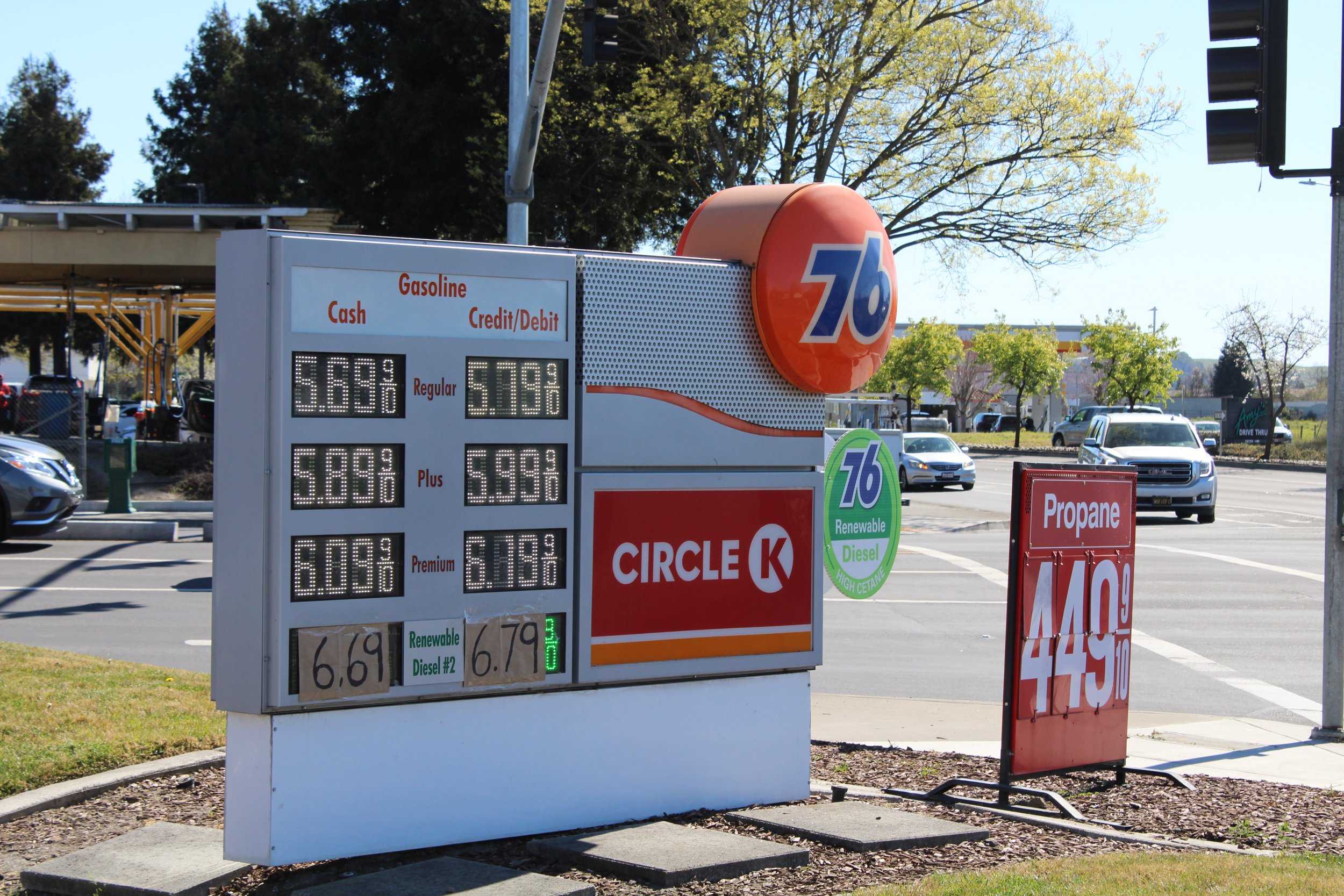The dramatic increase in gas prices seen across California this week is forcing Sonoma State University students to make a variety of sacrifices.
Gas prices have been on the rise for years nationwide, however, this week prices hit record highs following President Joe Biden’s decision to stop buying oil from Russia.
Paris Gayda, a 20-year-old Psychology major has to work two part-time jobs just in order to pay their bills. When they first bought their car six months ago, it only cost around $40 to fill up their tank. This week, Gayda paid $70 to fill up their tank.
“The gas prices have greatly impacted me financially. I have had to make the decision to not attend class [on campus] every week in order to save my gas,” Gayda said.
Aleksa Chavez is a 23-year-old Early Childhood Studies major who still lives on campus, but she likes to visit her family in San Jose often. “I’m getting homesick more than usual now, but gas costs too much to be going back and forth from school and home,” said Chavez.
Chavez’s story is one many students can relate to.
Jackie, a 20-year-old Liberal Arts major, is also afraid she won’t be able to go home as often due to the rise in gas prices. Jackie explained how it’s her first semester at SSU as a transfer student and being away from her family has been taking a toll on her mental health.
It’s the first time she’s ever been away from them for this long. Since starting school, she’s been going home for the weekend about every two weeks. With the gas prices increasing, going home has become harder.
“I’m not working so I rely solely on the extra money I have saved from my student loans, which isn’t a lot, it’s money I have to split between gas, food, and other necessities,” Jackie said. “I went home this past weekend and spent more than $100 on gas for this trip. Gas was a bit under $5 at home and was over $5 here. Now with gas prices being over $6, I’m afraid I won’t be able to afford going home for spring break.”
The expensive gas prices seen nationwide are a supply and demand issue.
Russia is a major producer and exporter of oil and natural gas and on Mar. 8, President Biden announced he would stop buying oil from Russia.
Economics professor, Dr. Florence Buvet, provided some insight into this issue.
The US does not import a lot of oil from Russia because we produce a lot of our own now thanks to fracking, Buvet explained. However, the U.S. is still experiencing spikes in the price of gasoline because it relies heavily on the global price of crude oil. Around 50% of the gasoline price is determined by the crude oil price. Because the price of oil and, thus, the price of gasoline depends a lot on the crude oil world market, there is not much the government can do right away to lower prices.
“Right now prices are on the rise because the market is expecting higher prices in the future because there would be a decline of supply in the US once the embargo is in effect. As a result, people want to buy crude oil on the world market now before the price starts rising once the embargo on Russian oil is in place,” Buvet said. “This is what we call self-fulfilling expectations. By increasing the demand for oil now, buyers are driving up the current price, just based on their expectations for the future.”
There isn’t much the government can do currently to help these prices. The US is a market economy where the government doesn’t have direct control over price setting. Prices are set by supply and demand.
“The government could try to boost the supply of crude oil but allowing more US production but this would take several months to kick in and there might be environmental issues with allowing more oil drilling in some areas,” Buvet said. “The other thing they could do is ask other oil-producing countries to increase their supply. Pres. Biden tried to contact some countries in the Middle East on this issue but apparently (based on what I read in the New York Times), these countries did not show interest in doing so because they benefit from these higher crude oil prices.”
If the war in Ukraine continues to drag on, prices could continue to go up. “A reversal of the price trend will depend on how the situation evolves in Ukraine and Russia and whether other countries increase their oil production to make up for the missing Russian oil,” said Buvet.
Professor and Chair in the Department of Economics, Dr. Chong Uk Kim also provided insight into what the US can do currently to lower prices, “The Federal government can provide more gas to American people from other sources such as Venezuela. On the State level, for example, the State of California can suspend the gas tax which is currently 51.1 cents per gallon,” Kim said.
STAR// Noah Clarke
Gas prices at the 76 station off of Golf Course Drive.





![[Both photos courtesy of sonoma.edu]
Ming-Ting Mike Lee stepped in as the new SSU president following Sakakis resignation in July 2022](https://sonomastatestar.com/wp-content/uploads/2024/04/CC4520AB-22A7-41B2-9F6F-2A2D5F76A28C-1200x1200.jpeg)


























